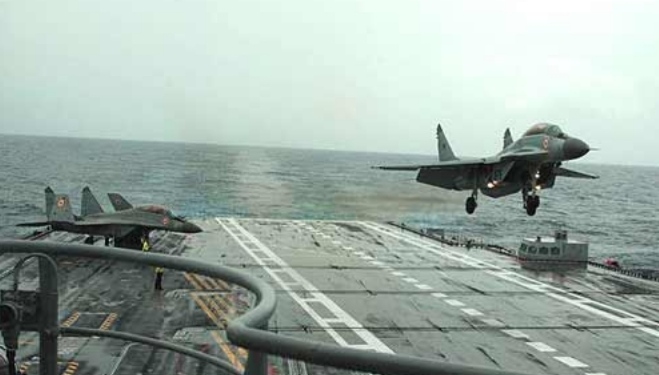India Will Choke Maritime lifeline Of China

By
Colonel Awadhesh Kumar
India is going ahead full steam to enhance its naval capabilities, especially its maritime Surveillance and Strike facility including its fleet of nuclear and conventional submarines. It is believed by some experts to have been prompted by China’s military modernisation and its increased activity in the Indian Ocean and the narrow Malacca Strait, which connects it to the South of China Sea.. India’s growing focus on submarine warfare was underscored after it was included as part of the joint naval drills in various bilateral joint exercises.
China is playing psychological warfare through its LAC incursions and negotiations and now wants to have a status quo… but it should realise that now things are very different than 1962. India now has the capacity to hold the Chinese onslaught at the LAC itself and then take the battle into Tibet.
Even if China managed to prevent India from gaining any foothold inside Tibet in a war on land, it would be impossible for the PLA navy to break India’s maritime containment of Beijing’s jugular vein passing through the Indian Ocean Region. This has been articulated by many Chinese military experts themselves.
A Hong Kong-based English daily South China Morning Post (SCMP) had quite sometime back pointed to the importance of the Indian Ocean as the economic lifeline of China. As a giant economy, China is largely reliant on imported fuel and, according to figures published by Chinese state media, more than 80% of its oil imports sail through the Indian Ocean or Strait of Malacca.
India has never succumbed to China’s carrot and stick’ strategies. On the other hand it is strategically located at the heart of China’s energy lifeline and the ‘Belt and Road Initiative’, and offending India will only push it towards greater military cooperation with the Americans, Japan and Australia. Beijing believes that the Americans are scheming to contain China by blocking the Malacca Strait and the Indian Ocean.
Apart from raising tensions between India and China, earlier the Doklam standoff and now the Galwan Clashes and its fallout could potentially destroy the Beijing’s Belt and Road Initiative (BRI), Chinese scholars and experts have warned for the first time. A Macau-based military expert Antony Wong Dong had earlier cautioned that Beijing’s hardball politics are pushing New Delhi further away and could end up making it an long term enemy.
The Galwan is the worst military stand-off in more than three decades since 1986 and has fuelled anti-Chinese sentiment not only in India, as mistrust and hostility between the two countries run deep, but also in most parts of the World.
In case not properly handled, the border row could have a long-term impact on China’s efforts to expand its diplomatic and economic influence even in the Asia-Pacific region and the rest of the World with its Belt and Road Initiative.
India is one of the most important strategic Country for China’s ‘Belt and Road Initiative’ because of its geographic location. Beijing has been trying to lure India to join ‘Belt and Road’ projects by saying that both countries stand to benefit from them strategically and economically. However the latest tensions have soured bilateral ties completely.
It may be recalled that Delhi had boycotted the BRI Summit in Beijing on the grounds that China-Pak-Eco-Corridor under BRI violates India’s sovereignty and that the initiative lacks transparency. Referring to India’s position on BRI at the maiden Indo-US Forum Foreign Minister Late Sushma Swaraj had said, “…We have also outlined the principles that should be adhered to in undertaking connectivity initiatives, including ensuring respect for sovereignty and territorial integrity.”
China initially thought that even without India, BRI would take off and flourish. It began to flounder after initial euphoria. The Chinese Pakistan Economic Corridor through Pakistan Occupied Indian territory of Ladhak, has now proved to be a $ 60 billion + blunder by the Chinese.
China has always been well aware of the futility of an all-out war for a desolate border area that is “frozen for up to eight months of the year”. Besides the human casualties, the logistical cost of a border conflict between China and India would be inestimable.”



